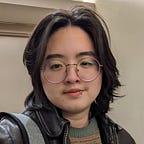Writing Ourselves In
When I started my novel as a sixth grader, all of my characters were straight, white, and cisgender.
I also hated myself. It was no coincidence.
I remember standing in front of the bathroom mirror when I was five years old, looking at a picture of Disney’s Cinderella on my tube of toothpaste. Frustrated and already feeling the beginnings of self-hate, I told my dad that I wished I had blonde hair and blue eyes.
“White = beautiful” was ingrained in me before I even understood the concepts of race and beauty.
I didn’t expect that the process of writing my book would open up something I’ve been struggling with for as long as I can remember. But I’m creating characters, giving them depth and personality, and I find myself thinking things that I would consider terribly racist and ridiculous coming from anyone else. “But this character can’t be Asian, they’re trans!” my brain automatically objects, when I myself am Asian and trans.
Why do I think these things when I’m living proof that they are no more than stereotypes?
I’m angry. I’m angry that I, a queer and non-binary person of colour, still subconsciously see the straight, white, and cisgender identity as the “default”. I’m disappointed; I’m guilty, even as I try to assure myself that this is not my fault.
I am terrified, because as a creator, there *is* no default. If I can create a universe from pencil and paper, from pixels on a screen, then I can create something out of nothing. I expected these infinite possibilities to feel like freedom, and at times, it still does — I often feel the thrill of writing into existence something that is entirely mine. But sometimes, it feels less like weightlessness and more like freefall.
It’s a powerful feeling to realise that you are not limited in what you can create. It’s also surprisingly overwhelming. Limits are easy — characters fit into boxes, and creation becomes nothing more than choosing from a stock pile of linked traits. There are only so many combinations you can create until you begin to repeat yourself.
But we cannot afford to repeat ourselves. The deeper I get into writing this story, the more I am realising that this is a cycle, so toxic and suffocating that it’s become a spiral. We write stories based on what we know, but our knowledge is fallible; it’s biased, and too often at our own expense. And so we write ourselves into tighter spaces. We write ourselves out of our own stories, because we have been taught that we do not belong in them.
I want my writing to be a home. I want it to be a reminder and a promise that we will not stop finding homes in places where the odds are stacked against us. That we belong here just as much as those who tried to convince us otherwise.
I am still recovering from nineteen years of media that taught me that beauty is something some people possess, and others must chase. I know it’ll take more than a single book to change something so deeply embedded in society.
But god, it’s a start. Maybe it’s what I needed as a five-year-old.
Maybe it’s what I need right now.
